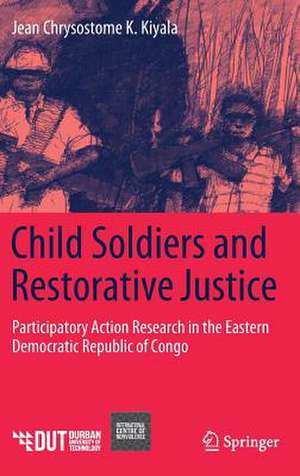Child Soldiers and Restorative Justice: Participatory Action Research in the Eastern Democratic Republic of Congo
Autor Jean Chrysostome K. Kiyalaen Limba Engleză Hardback – 31 iul 2018
| Toate formatele și edițiile | Preț | Express |
|---|---|---|
| Paperback (1) | 653.00 lei 6-8 săpt. | |
| Springer International Publishing – 20 dec 2018 | 653.00 lei 6-8 săpt. | |
| Hardback (1) | 659.53 lei 6-8 săpt. | |
| Springer International Publishing – 31 iul 2018 | 659.53 lei 6-8 săpt. |
Preț: 659.53 lei
Preț vechi: 775.91 lei
-15% Nou
Puncte Express: 989
Preț estimativ în valută:
126.22€ • 131.29$ • 104.20£
126.22€ • 131.29$ • 104.20£
Carte tipărită la comandă
Livrare economică 15-29 aprilie
Preluare comenzi: 021 569.72.76
Specificații
ISBN-13: 9783319900704
ISBN-10: 3319900706
Pagini: 423
Ilustrații: XXXIV, 518 p. 41 illus., 29 illus. in color.
Dimensiuni: 155 x 235 mm
Greutate: 0.95 kg
Ediția:1st ed. 2019
Editura: Springer International Publishing
Colecția Springer
Locul publicării:Cham, Switzerland
ISBN-10: 3319900706
Pagini: 423
Ilustrații: XXXIV, 518 p. 41 illus., 29 illus. in color.
Dimensiuni: 155 x 235 mm
Greutate: 0.95 kg
Ediția:1st ed. 2019
Editura: Springer International Publishing
Colecția Springer
Locul publicării:Cham, Switzerland
Cuprins
1. Introduction.- 2. General Introduction on the Decmocratic Republic of Congo.- 3. Child Soldierung Global Perspectives and in the Democratic Republic of Congo. 4. Reintegrating and Healing Child Soldiers.- 5. Child Protection and Accountability.- 6. Restorative Justice in Theory.- 7. An Integrative Approach to Child Soldiering Accountability.- 8. Transitional Justice from an African Perspective.- 9. Research Design and Methodology.- 10. Diagnosing the Problem: Perspectives from the Field.- 11. Accountability and Reintegration of Child Soldiers via Baraza.- 12. Restorative Justice Peacemaking Circles and Child Soldiering.- 13. Preventing Child Soldiering.- 14. Conclusion and Recommendation.- Bibliography.- Appendices.- On Durban University of Technology.- On the International Centre of Nonviolence.- On the Author.- Index.
Textul de pe ultima copertă
This book investigates how, while children used as soldiers are primarily perceived as victims of offences against international law, they also commit war atrocities. In the aftermath of armed conflict, the mainstream justice system targets warlords internationally, armed groups and militias’ commanders who abduct and enrol children as combatants, leaving child perpetrators not being held accountable for their alleged gross human rights violations. Attempts to prosecute child soldiers through the mainstream justice system have resulted in child rights abuses. Where no accountability measures have been taken, demobilised young soldiers have experienced rejection, and eventually, some have returned to soldiering. This research provides evidence of the potential of restorative justice peacemaking circles and locally-based jurisprudence – specifically the Baraza - to hold former child soldiers accountable and facilitate their reintegration into society.
Caracteristici
Describes policies, and local and international standards on child soldiering accountability Enhances child soldiers' reintegration and prevention through restorative justice and locally-based approaches, such as Baraza (conflict resolution forum) Serves as entry point to making former child soldiers peacemakers in their communities through peacemaking circles and Baraza
